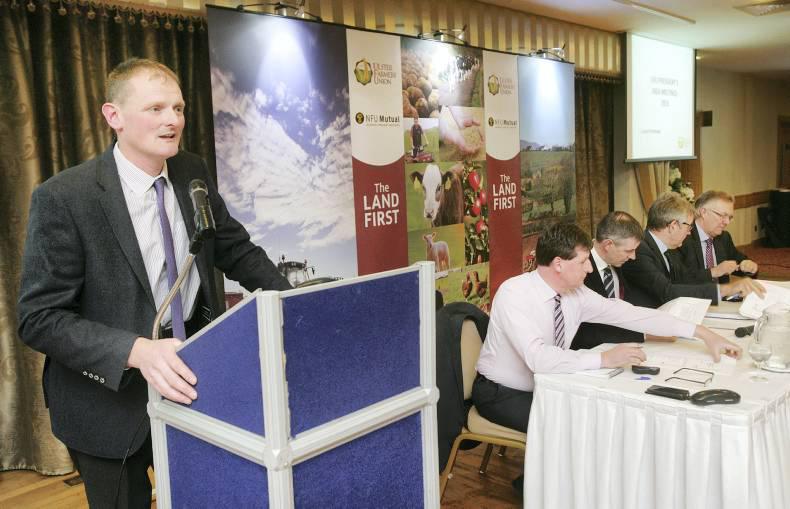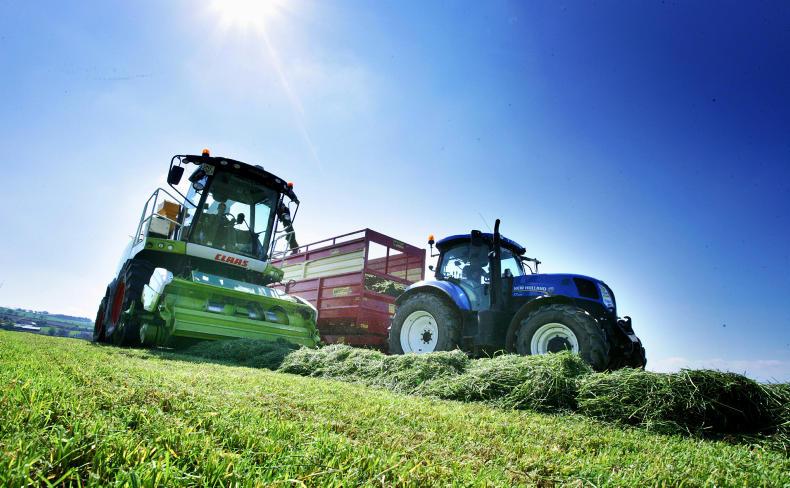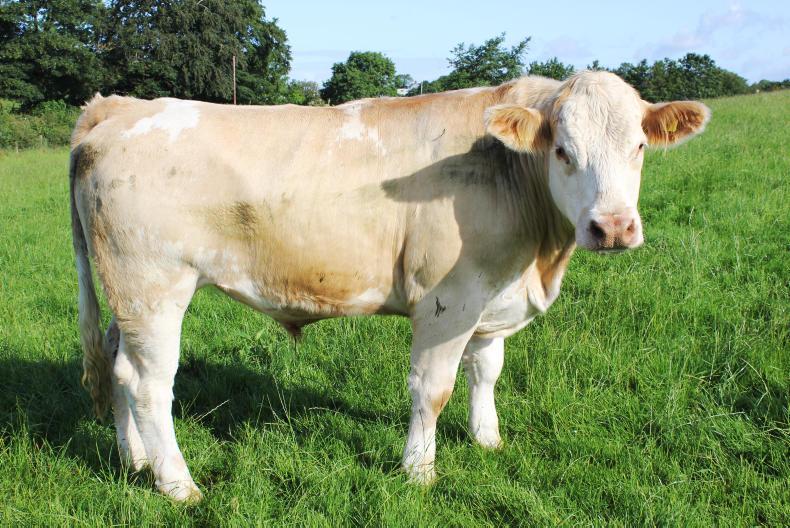With CAP reform off the agenda for now, it has created somewhat of a void within agri-politics and left the Ulster Farmers’ Union (UFU)without a headline issue to lead with during its 2016 president’s area meetings.
So, instead of being bombarded with facts and figures around different CAP reform models, UFU members who attended the first of six president’s area meetings in Enniskillen on Monday night were hit with ‘‘examples of UFU successes in 2015’’.
To reinforce the point, the 21 successes were listed in a handout placed on every seat. Presumably, the leadership team wanted to get across to members the breadth of its lobbying activity. In the end, it was a relatively subdued meeting which probably reflected the mood among farmers at present.
Included in the successes listed by the UFU was the transitional payment to farmers in Disadvantaged Areas (DA), the £5.1m given to NI under the EU dairy aid package, Chinese approval for pork exports, 95% of CAP payments issued in December and an extra 10% compensation for land vesting.
Other successes included the compulsory bovine viral diarrhoea (BVD) eradication scheme due to start on 1 March 2016.
According to deputy president Ivor Ferguson, eradicating BVD will save NI farmers £30m annually. He also maintained that the union has highlighted to Animal Health and Welfare NI (the industry body leading on BVD eradication) the need to come up with some concessions for farmers who participated in the voluntary phase of the scheme.
On other animal diseases, the UFU leadership maintained that despite obtaining brucellosis-free status in 2015, brucellosis testing on farms will probably continue for another three years.
With regard to bovine TB, they were asked if they had agreed that farmers should pay for TB testing.
“What we said was that if DARD is willing to deal with the wildlife problem, farmers may consider paying for testing as in the Republic of Ireland,” said UFU president Ian Marshall. “I can’t see paying for TB testing coming on to our radar for a very long time. DARD has a lot of work to do before then,” added the straight-talking Ferguson.
He also maintained that the union is supportive of meat-industry lobbying for NI to obtain negligible-risk status for BSE. “Processors tell us it is important to get in there first. Unfortunately, it looks as though DARD is dragging its feet at the moment,” said Ferguson.
He would also like to see more done to promote NI produce, and more cooperation between Government and industry, and between marketing bodies such as the Livestock and Meat Commission and Invest NI. “Too often, we have people looking after their own little empires,” said Ferguson.
What we said was that if DARD is willing to deal with the wildlife problem, farmers may consider paying for testing as in the Republic of Ireland
On the thorny issue of the UFU position on a possible British exit from the EU, Marshall maintained that without being fully informed of the facts they were not able to support either side at present. One of the key issues is the question of whether the UK Treasury will step in and support farmers in the event of an EU exit.
Subsidy income down
In recent weeks, a number of farmers have pointed out that their subsidy incomes will be significantly reduced in 2016, not just because of changes under the Basic Payment Scheme, but also due to an end to agri-environment agreements.
When asked about a new scheme, UFU chief executive Wesley Aston said he hoped that it would be open for applications at some stage later this year.
That probably means it will be 2017 before new agreements start.
He was also asked about changes to support under the area of natural constraint (ANC) scheme and the possibility of parts of NI in Disadvantaged Areas being brought in under a new ANC classification. At present, only the severely disadvantaged area (SDA) is classed as ANC, with payments only guaranteed to 2017.
“The process of devising a new map has slipped a bit. When we do get a new map, we can then see what we might do with an associated scheme around that,” said Aston.
£8m funding for livestock genetics project
The livestock genetics sub-group of the Agri-Food Strategy Board has asked the Government to come up with £8m of funding over a four-year period to take forward genetic improvement work within the dairy, beef and sheep sectors in NI.
“A business case has been made to Government. We are waiting on them to come back,” said Ian Marshall, the current chair of the sub-group.
He confirmed that the union is one of four organisations in NI who each put £20,000 of funding to pay for New Zealand company, AbacusBio, to undertake a review of options in NI. That review concluded that NI needs its own data hub, said Marshall.
The aim of the hub is to coordinate data collection across livestock sectors, as well as generate information relating to genetic evaluation performance and management use.
Currently, agricultural research organisation, AgriSearch, is going through a process to recruit a project manager to take forward the work.
However, the question remains as to why NI isn’t simply joining up with the Irish Cattle Breeding Federation (ICBF) in the Republic of Ireland. “ICBF is well down the path. We are seriously behind in NI,” acknowledged Marshall.
There are a number of issues, but the crux seems to be money, and the millions put into ICBF by the Irish Government. If NI were to join with them now, it would come at a high cost.
Grant scheme must open sooner rather than later, says Marshall
Despite some suggestions that the upcoming £200m Farm Business Investment Scheme will open in two phases (phase one this spring for grants of £5,000 to £30,000 and phase two in the autumn for grants up to a maximum of £250,000), UFU president Ian Marshall has urged DARD to get both schemes open as soon as possible.
“Opening it in two phases is not acceptable. I would like to see something out there by the end of March, with diggers on site by mid-summer. There is no point in opening the big grant scheme in October or November. DARD must deliver sooner rather than later,” he said.
Marshall also sought to reassure farmers that they would not be disadvantaged by not being part of the CAFRE farm business development groups.
“There is no disadvantage. Farmers will still have access to advisory staff, etc. Those in the groups won’t be prioritised for the grant scheme,” he said.









SHARING OPTIONS